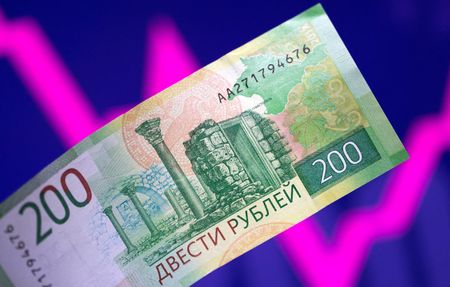 1
1 1
1

(Reuters) -Russia retaliated in what it has called an “economic war” with the West on Tuesday by offering to buy back its $2 billion Eurobonds maturing next month in roubles rather than dollars.
The finance ministry offer on Eurobonds maturing on April 4, Russia’s biggest debt payment this year, follows Western moves to tighten sanctions against the country over its invasion of Ukraine and to freeze Moscow out of international finance.
Moscow, which calls its actions in Ukraine a “special military operation”, says Western measures amount to “economic war”. In response, it has already demanded foreign firms pay for Russian gas in roubles rather than dollars or euros.
It was not immediately clear if bondholders would be forced to accept roubles if they rejected the offer, a move that would break the terms of the bond and would again raise the prospect of Russia’s first external sovereign default in a century.
“It’s important to note that this is tender offer and not a final decision that these bonds will be paid in roubles. Perhaps, Russian authorities want to gauge investors’ willingness to accept payment in roubles?” said Seaport Global credit analyst Himanshu Porwal.
Tim Ash of BlueBay Asset Management, which is not a bondholder, said the move was part of a fight bank by Russia’s central bank and finance ministry “to fend off default and stabilise markets and the rouble”.
Ash said the United States’ Office of Foreign Assets Control (OFAC), which enforces U.S. sanctions, “should make clear it will not extend the general licence when it falls due on May 25”, the current deadline for U.S. individuals or entities to receive payments on Russian sovereign bonds.
Russia’s finance ministry said in its statement on Tuesday that bondholders should submit requests to sell their holdings to the National Settlement Depository between 1300 GMT on March 29 and 1400 GMT on March 30.
SECURING PAYMENT
The Eurobonds would be bought at a price equivalent to 100% of their nominal value, it said.
“I think this is to allow Russian investors to get the payment,” said one fund manager, adding that it would help them given Euroclear has been blocking dollar payments to the Russian clearing system.
The finance ministry did not say how much of the $2 billion in outstanding Eurobonds it planned to buy back or what its actions could be should bondholders refuse to accept the offer.
The bond has a 30-day grace period and no provisions for payments in alternative currencies, JPMorgan said.
According to Refinitiv database eMAXX, which analyses public filings, major asset managers such as Brandywine, Axa, Morgan Stanley Investment Management, BlackRock were recently among the holders of the bond coming due on April 4.
The finance ministry had said earlier on Tuesday it had fully paid a $102 million coupon on Russia’s Eurobond due in 2035, its third payout since Western sanctions called into question Moscow’s ability to service its foreign currency debt.
Russian payments have so far gone through, staving off a default. Sanctions have frozen a chunk of Moscow’s huge foreign reserves and Russian officials have said any problem with payment that led to a formal declaration of default would be an artificial default.
The rouble tumbled in value after the West imposed sanctions over the Ukraine crisis, plunging as much as 40% in value against the dollar since the start of 2022. It has since recovered, trading in Moscow at around 83 roubles to the dollar, down about 10%.
Russia’s next payment is on March 31 when a $447 million payment falls due. On April 4, it also should pay $84 million in coupon a 2042 sovereign dollar bond.
(Reporting by Reuters; Writing by Edmund Blair; Editing by Alexander Smith)